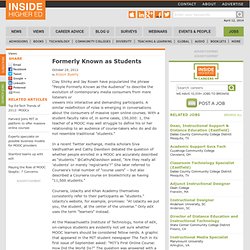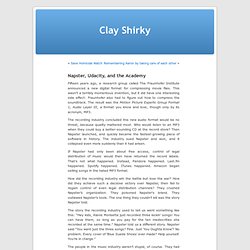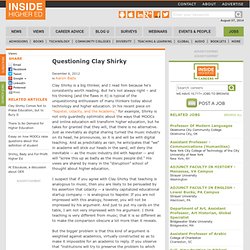

Cognoscology and MOOCS. READ. C21SMOOC. FAV POEMS. TOOLS. The Challenge. Learning Analytics. Essay on how MOOCs raise questions about the definition of student. Clay Shirky and Jay Rosen have popularized the phrase “People Formerly Known as the Audience” to describe the evolution of contemporary media consumers from mere listeners or viewers into interactive and demanding participants.

A similar redefinition of roles is emerging in conversations about the consumers of massive open online courses. With a student-faculty ratio of, in some cases, 150,000: 1, the teacher of a MOOC may well struggle to define his or her relationship to an audience of course-takers who do and do not resemble traditional "students.
" In a recent Twitter exchange, media scholars Siva Vaidhyathan and Cathy Davidson debated the question of whether people enrolled in a MOOC are accurately described as “students.” @CathyNDavidson asked, "Are they really all 'students' or merely 'registrants'? " She later referred to Coursera’s total number of "course users" – but also described a Coursera course on bioelectricity as having "11,500 students. " RSA Animate - Changing Education Paradigms. Massively MOOC. » Napster, Udacity, and the Academy Clay Shirky.
Fifteen years ago, a research group called The Fraunhofer Institute announced a new digital format for compressing movie files.

This wasn’t a terribly momentous invention, but it did have one interesting side effect: Fraunhofer also had to figure out how to compress the soundtrack. The result was the Motion Picture Experts Group Format 1, Audio Layer III, a format you know and love, though only by its acronym, MP3. The recording industry concluded this new audio format would be no threat, because quality mattered most. Who would listen to an MP3 when they could buy a better-sounding CD at the record store? Then Napster launched, and quickly became the fastest-growing piece of software in history. If Napster had only been about free access, control of legal distribution of music would then have returned the record labels. How did the recording industry win the battle but lose the war?
The people in the music industry weren’t stupid, of course. But who faces that choice? Essay critiques the ideas of Clay Shirky and others advocating higher ed disruption. Clay Shirky is a big thinker, and I read him because he’s consistently worth reading.

But he’s not always right – and his thinking (and the flaws in it) is typical of the unquestioning enthusiasm of many thinkers today about technology and higher education. In his recent piece on "Napster, Udacity, and the Academy," for example, Shirky is not only guardedly optimistic about the ways that MOOCs and online education will transform higher education, but he takes for granted that they will, that there is no alternative. Just as inevitably as digital sharing turned the music industry on its head, he pronounces, so it is and will be with digital teaching. And as predictably as rain, he anticipates that "we" in academe will stick our heads in the sand, will deny the inevitable -- as the music industry did with Napster -- and will "screw this up as badly as the music people did. " His views are shared by many in the "disruption" school of thought about higher education.